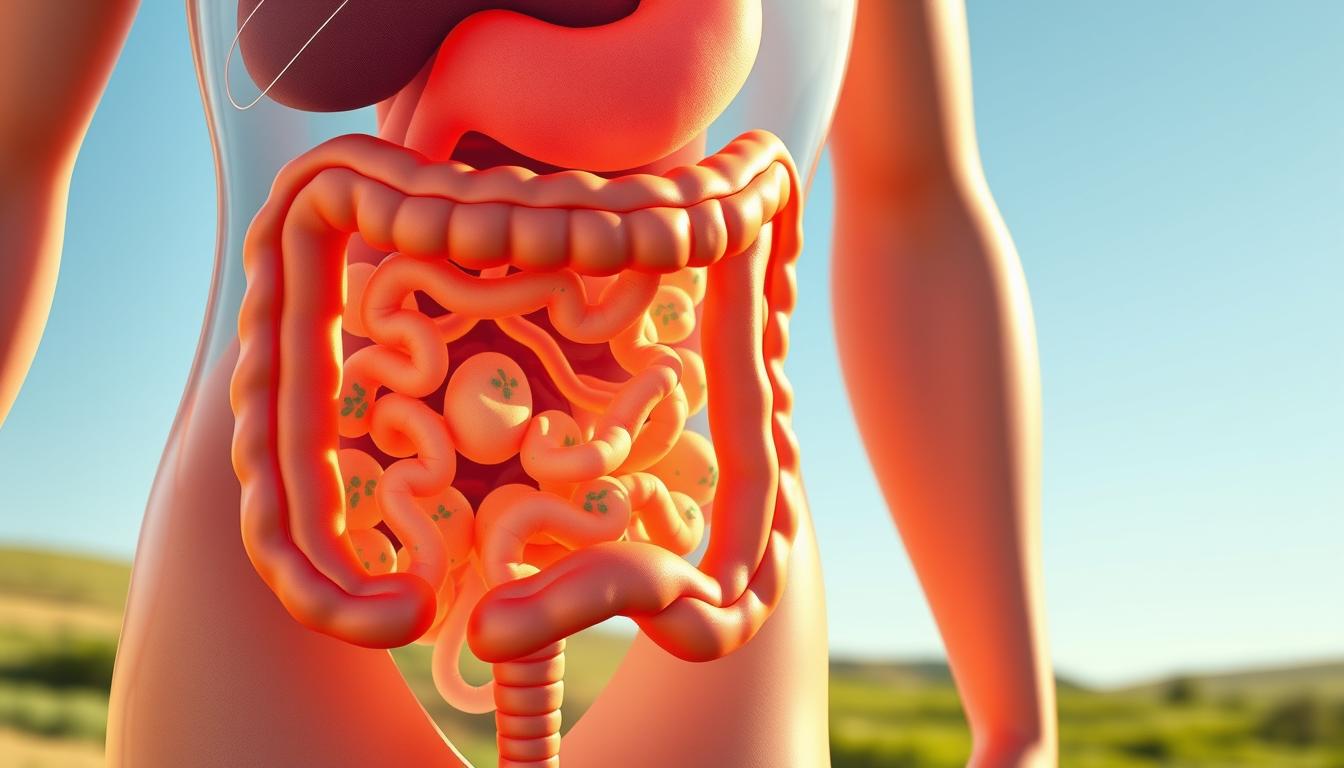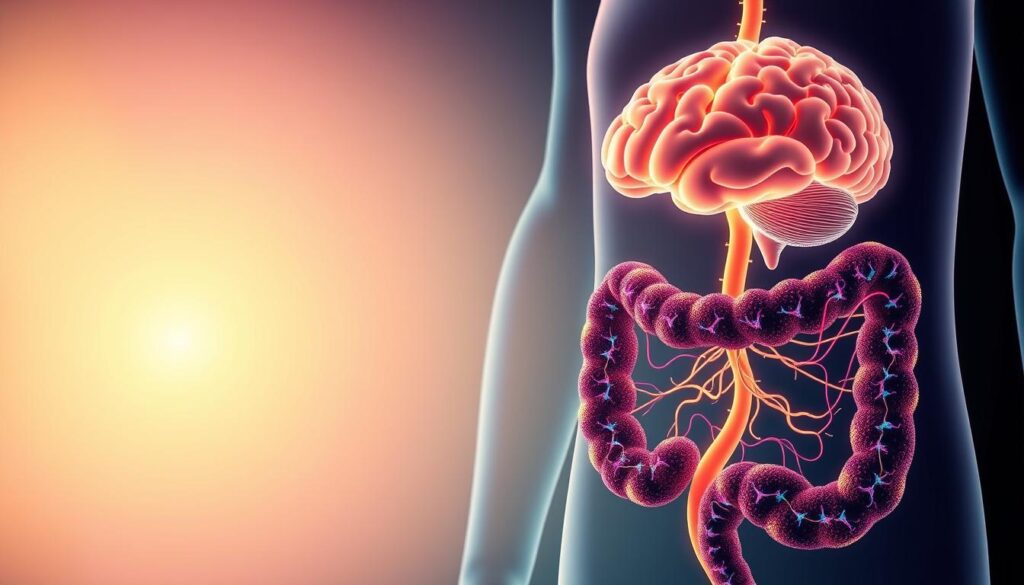Boost Your Well-Being with a Healthy Gut
A healthy gut is key to feeling good. Cara Marrs, a dietitian, says, “A working gut…

A healthy gut is key to feeling good. Cara Marrs, a dietitian, says, “A working gut helps our whole body stay balanced.” This balance is important for a healthy stomach.
A healthy gut does more than help with digestion. It also boosts your health in many ways. Taking care of your gut can make you feel better in many ways.
Key Takeaways
- A healthy gut microbiome is important for feeling good.
- Good gut health helps with digestion, immune function, and mental health.
- Focus on gut health for a better body balance.
- Eating right is key to a healthy gut.
- Small diet changes can greatly improve your gut health.
Understanding Gut Health: What Is It?
Gut health is about the balance of tiny living things in your belly. This balance is key for a healthy belly. It also helps in many other ways.
Your belly is full of tiny creatures, some good, some not so good. Dr. Sarmed Sami says, “A balanced gut is important for a healthy belly. But it’s also good for your whole body.”
The Gut Microbiome Explained
The gut microbiome is a mix of tiny living things in your belly. They help break down food and absorb nutrients. They even make some vitamins.
A diverse gut microbiome is key to good health. It keeps your belly healthy and helps your immune system. What you eat, how you live, and your environment can change your gut’s balance.
The Role of Gut Health in Overall Wellness
Gut health is connected to your overall health, including your immune system and mind. Your belly and brain talk to each other through the gut-brain axis.
A healthy gut helps your immune system by making antibodies and activating immune cells. This shows how important a balanced gut is for your health.
- A balanced gut microbiome supports digestive health.
- Gut health influences the immune system.
- A healthy gut is linked to overall wellness.
The Connection Between Gut Health and Immunity
Your gut health is key to a strong immune system. A lot of your immune system lives in your gut. So, keeping your gut healthy is very important.
How the Gut Influences Immune Responses
Your gut has trillions of tiny living things. These tiny friends help keep you safe from bad germs. They also help make antibodies to fight off sickness.
Cara Marrs says, “The gut is home to 70% of our immune tissue.” This means it’s very important for fighting off infections and diseases. Keeping your gut bacteria in balance is key.
Foods to Strengthen Your Immune System
Eating foods that are good for your gut can boost your immune system. Some great foods include:
- Probiotic-rich foods like yogurt, kefir, and sauerkraut. They keep your gut bacteria healthy.
- Prebiotic foods such as asparagus, bananas, and onions. They feed the good bacteria in your gut.
- Antioxidant-rich foods like berries, leafy greens, and other fruits and veggies. They help fight off inflammation and stress.
Eating these foods and keeping a balanced diet helps your gut health. This, in turn, makes your immune system stronger.
Signs of Unhealthy Gut Function
Keeping your gut healthy is key for feeling good. Knowing when your gut is not healthy is the first step. Your gut health is tied to your digestive health. Any imbalance can cause many symptoms.
Digestive Issues: What to Look For
Digestive problems are a clear sign of an unhealthy gut. Dr. Rachel Schiesser says, “If you often have digestive symptoms, your gut microbiome might be off balance.” Look out for:
- Bloating and gas
- Abdominal pain or cramps
- Diarrhea or constipation
- Nausea
These symptoms can make you feel bad and mess up your day. If you see these signs often, it’s time to check your gut health.
Mood Changes and Mental Fog
The gut-brain connection is strong. An unhealthy gut can mess with your mood and brain. You might feel moody, foggy, or have trouble focusing. Studies show a big link between gut health and mental health. A healthy gut can help your mood and brain function better.
Skin Conditions Linked to Gut Health
Skin problems like acne, eczema, or psoriasis can point to an unhealthy gut. The gut and skin are connected. Gut inflammation can show up as skin issues. Fixing your gut might help your skin too.
Spotting these signs is the first step to a healthier gut. Understanding how your gut affects your health helps you make better choices for your well-being.
The Impact of Diet on Gut Health
Your diet is key to a healthy gut. What you eat can help or hurt your gut’s balance. Eating foods rich in nutrients is important for a healthy gut.

Probiotics: The Good Bacteria
Probiotics are good bacteria that help your gut. Cara Marrs says they can fill your gut with good bacteria. You can find them in foods like yogurt and sauerkraut, or take them as supplements.
Probiotics can make you digest better, boost your immune system, and even help your mind.
Prebiotics: Feeding Your Gut
Prebiotics are fibers that feed your good bacteria. Foods like asparagus and bananas are full of them. Eating these foods helps your gut bacteria grow.
Eating both probiotics and prebiotics can make your gut even healthier. This is called synbiotics.
Foods to Avoid for a Healthier Gut
Some foods are bad for your gut. Foods high in sugar and processed foods can upset your gut. Also, foods you’re allergic to can cause problems.
By avoiding bad foods, you can help keep your gut healthy. A healthy gut is important for feeling good overall.
Lifestyle Choices That Affect Gut Health
Your gut health is affected by many things, like stress and sleep. Diet is important, but so are your lifestyle choices. A healthy gut is good for your body and mind.
The Role of Stress on Digestion
Too much stress is bad for your gut. Dr. Sarmed Sami says, “Chronic stress can harm your gut microbiome.” It can make you feel bloated and hurt your stomach.
Managing stress is important for a healthy gut. Try meditation, yoga, or deep breathing to help.
Importance of Sleep for Gut Restoration
Good sleep helps your gut heal. It’s when your body fixes itself and gets stronger. Bad sleep can mess up your gut and cause health problems.
- Keep a regular sleep schedule for your gut.
- Make your bedroom a sleep place.
- Don’t drink caffeine or use screens before bed.
Good sleep and stress control can really help your gut. These changes, along with a healthy diet, make your digestive system stronger.
“The gut-brain connection is complex and bidirectional, with each influencing the other.” This shows why diet and lifestyle are both key for better gut health.
How Gut Health Affects Mental Health
Learning about the link between gut health and mental health can change your life. Your gut and brain talk to each other through a special network called the gut-brain axis.

The Gut-Brain Axis: What You Need to Know
The gut-brain axis is amazing. It connects your feelings and thoughts with your gut. This link is both physical and chemical, using special messengers for your mind.
Key parts of the gut-brain axis are:
- The vagus nerve, which helps your gut and brain talk
- Neurotransmitters like serotonin and dopamine, made in your gut
- The gut microbiome, which affects your brain and actions
Nutrition and Mental Well-Being
What you eat is very important for your mind. Some foods can hurt or help your gut. Cara Marrs says, “Your diet and mental health are closely tied because of your gut’s role in immunity and serotonin production.”
Here are some ways to help your mental health through food:
- Eat more probiotics from foods like yogurt and sauerkraut
- Add prebiotic-rich foods like asparagus and bananas to feed your good bacteria
- Stay away from processed foods and sugars that can upset your gut
Eating well and keeping your gut healthy can greatly improve your mental state and overall health.
Tips for Improving Gut Health
A healthier gut is within reach. It starts with daily choices. A few simple habits can boost your digestive health and well-being.
Incorporating Fermented Foods
Fermented foods are full of probiotics. These are good bacteria for a healthy gut. Yogurt, sauerkraut, and kimchi are tasty and good for you.
Try adding fermented foods to your meals. Have yogurt with breakfast or sauerkraut in your salad. Dr. Rachel Schiesser says, “Probiotics balance the gut microbiome, which is key for health.”
Staying Hydrated for a Healthier Gut
Drinking water is vital for a healthy gut. It helps digest food and absorb nutrients. It also stops constipation by making stool soft and regular.
Drink at least eight glasses of water a day. More water is needed if you’re active or live in a hot place.
Regular Exercise and Its Benefits
Exercise is great for a healthy gut. It makes gut muscles work better, improving digestion and reducing IBS symptoms.
“Exercise isn’t just good for your heart and muscles — it also benefits the gut.” – Dr. Rachel Schiesser
Regular exercise, like walking or yoga, is good for your gut. Try to do at least 30 minutes of moderate exercise daily for better gut health.
By changing your daily routine a bit, you can greatly improve your gut health. This will also make your life better overall.
The Role of Antibiotics in Gut Health
Antibiotics can harm your gut health. It’s key to know how to lessen their impact. They kill all bacteria, good and bad, upsetting your gut’s balance.

Antibiotics hurt both bad and good bacteria in your gut. This can cause digestive issues and weaken your immune system.
Disrupting Gut Flora
Antibiotics mess with your gut’s balance by killing off both good and bad bacteria. Cara Marrs says, “Antibiotics affect your gut microbiome. We may need them, but eating right after is key to help your gut.” This can lower the diversity of microbes in your gut, which is important for health.
To lessen harm, knowing which foods help your gut is vital. Eating gut health supplements and probiotic-rich foods is good.
Rebalancing the Gut Microbiome
After antibiotics, rebalancing your gut is important. Eat foods high in probiotics like yogurt, kefir, and fermented veggies. These foods add good bacteria to your gut.
- Eat probiotic-rich foods.
- Drink plenty of water to help your gut.
- Think about gut health supplements if needed.
Knowing the importance of gut health and taking steps to keep your gut balanced is key. It greatly affects your health and happiness.
Addressing Gut Health in Children
As a parent, making your child’s gut healthy is key. A balanced gut microbiome is vital for their growth. It affects their digestion, immune system, and mood.
Promoting Good Gut Health from an Early Age
Start with the food your kids eat. Gut-friendly foods are important. Fruits, veggies, and whole grains feed good gut bacteria.
Cara Marrs says, “Parents should eat well in front of kids. Share meals and offer many food choices.” This helps kids develop good eating habits and a positive food relationship.
The Importance of Balanced Nutrition
A balanced diet is key for kids’ gut health. They need lean proteins, healthy fats, and complex carbs. Gut health research shows a diverse diet keeps the gut strong.
Good gut health in kids means a strong immune system, better digestion, and mental health. Balanced nutrition and gut-friendly foods are essential. They help kids stay healthy for life.
The Link Between Gut Health and Weight Management
Keeping your gut healthy is key for managing your weight. Your gut microbiome helps your body digest food and absorb nutrients. It also helps control your weight.
Studies show a strong link between gut health and weight. Gut bacteria affect your metabolism, hunger, and fat storage. These are important for staying at a healthy weight.

How Gut Bacteria Influence Weight
Your gut is home to trillions of tiny living things. They help break down food, make vitamins, and keep your immune system strong. If your gut is out of balance, you might gain weight and have metabolic problems.
Dr. Sarmed Sami says, “A healthy gut helps your body absorb nutrients better.” This shows how important a balanced gut is for health and weight control.
Strategies for Maintaining a Healthy Gut
To keep your gut healthy and help with weight, try these tips:
- Incorporate Probiotics: Probiotics are good bacteria and yeast. You can find them in foods like yogurt, kefir, and sauerkraut.
- Eat Prebiotic-Rich Foods: Prebiotics feed the good bacteria in your gut. Foods like asparagus, bananas, and onions are good sources.
- Stay Hydrated: Drinking enough water is vital for a healthy gut. It helps with digestion and nutrient absorption.
- Exercise Regularly: Exercise boosts gut health by improving movement and balance of gut bacteria.
Using these tips can help your gut health and weight management. Remember, a healthy gut is essential for your overall well-being.
When to Seek Professional Help for Gut Issues
If you’re having ongoing gut problems, it might be time to see a doctor. A healthy lifestyle is key, but sometimes you need medical help.
Signs That Warrant a Doctor’s Visit
Some symptoms mean you should go to the doctor. These include:
- Severe abdominal pain that doesn’t get better or gets worse
- Blood in your stool or vomit
- Significant changes in bowel habits, like always having diarrhea or constipation
- Unexplained weight loss
- Fatigue or feeling very weak
Dr. Rachel Schiesser says, “If you’re dealing with digestive issues and you’re eating well, see your doctor.” This shows it’s important not to ignore symptoms that don’t go away.
Types of Specialists for Gut Health
For gut health problems, you might need to see a gastroenterologist. They focus on the digestive system. Start by talking to a healthcare provider to find the right specialist.
When looking for professional help, remember:
- Know your symptoms and health history
- Talk about your diet and lifestyle with your doctor
- Look into treatments, like gut health supplements and other therapies
By being proactive and getting help when you need it, you can greatly improve your digestive health and overall health.
Conclusion: Start Your Journey to Better Gut Health
Starting a journey to better gut health can make you feel much better. It’s a step towards being happier and healthier.
Nourishing Your Gut
Eating foods good for your gut is key. Add foods full of probiotics and prebiotics to your meals. This helps the good bacteria in your gut. It makes you stronger and helps you digest food better.
Simple Steps to a Healthier Gut
Begin by changing your diet and lifestyle a little bit. Cara Marrs says, “It’s never too late and you can start today… Feed your body what it needs to thrive 80 to 85% of the time for a lifetime and the other 15 to 20 percent you can relax.” This way, you keep your gut balanced and enjoy being healthy.
By following these easy steps and staying consistent, you’ll see how a healthier gut improves your health and happiness.
FAQ
What is the gut microbiome, and why is it important for overall health?
The gut microbiome is the trillions of tiny living things in your stomach. It helps keep your digestive system healthy. It also affects your immune system and makes vitamins.
A healthy gut microbiome is key for feeling good. It helps with digestion, mental health, and keeping you from getting sick.
How does gut health impact my immune system?
Your gut health is very important for your immune system. A healthy gut helps your body fight off sicknesses. It keeps your immune system from getting too strong or too weak.
Eating foods with probiotics, like yogurt, can help your immune system. So can eating foods with prebiotics, like bananas.
What are the signs of an unhealthy gut?
An unhealthy gut can cause bloating, constipation, or diarrhea. It can also make you feel moody, foggy, or cause skin problems like acne.
If you’re feeling these symptoms, your gut might not be healthy. It’s time to think about changing your diet.
How can I improve my gut health through diet?
To make your gut healthier, eat foods with probiotics like fermented veggies and yogurt. Add prebiotic-rich foods like whole grains and bananas to your meals.
Stay away from processed and sugary foods. They can hurt your gut bacteria. Drinking plenty of water is also important for a healthy gut.
Can stress and sleep affect my gut health?
Yes, stress and sleep can really affect your gut. Stress can mess up your gut bacteria. Not sleeping well can also hurt your digestion.
Try to relax and get enough sleep. This can help keep your gut healthy.
Is there a link between gut health and mental health?
Yes, your gut and brain are connected. An imbalance in your gut bacteria can lead to mental health problems like anxiety and depression.
Eating well is important for your mental health. A diet full of whole foods can help keep your mind healthy.
How can I rebalance my gut microbiome after taking antibiotics?
Antibiotics can mess up your gut bacteria. To fix this, eat foods with probiotics and consider supplements. Fermented foods and prebiotic-rich foods can also help.
Can gut health affect my weight?
Yes, your gut health can affect your weight. An imbalance in your gut bacteria can mess with your metabolism and weight.
Eating right, staying hydrated, and exercising can help with weight management. It also supports a healthy gut.
When should I seek professional help for gut issues?
If you have ongoing digestive problems or severe symptoms, get help. Talk to a doctor or a specialist like a gastroenterologist. They can give you advice on how to manage your gut health.
How can I promote good gut health in my children?
To help your kids have good gut health, feed them well. Give them probiotics, whole grains, and lots of fruits and veggies.
Limit foods that are bad for their gut. Encourage them to exercise and get enough sleep. This helps their gut health too.
